6 Luxurious Supercars Vying to Challenge Tesla's Electric Supremacy
Outsiders are getting into the game. And fast.
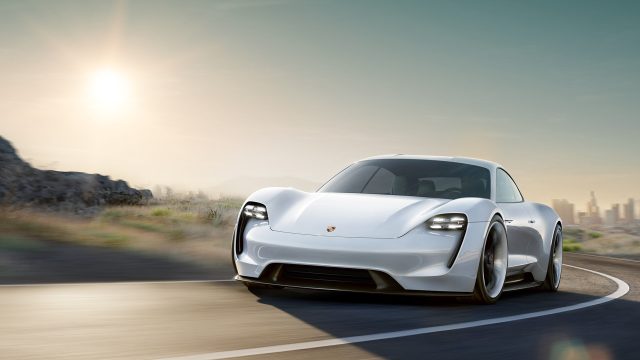
It's a great automotive irony that electric cars, though widely regarded as the vehicles of tomorrow, are actually simpler to make than the vehicles of yesterday. That's because electric cars require 80 percent fewer parts that the old-fashioned fuel-hogs do (many electrics do without transmissions, for instance), and the manufacturing process eliminates cost and complexity. The result? A car revolution in which outsiders—and I'm not just talking about Tesla here—are crowding into the game with great, viable machines.
That will explain why you've never heard of some of the brands on this list. But don't let that cloud your opinion: these are all uncompromising supercars that share full-on electric mobility and a performance that equals—if not exceeds—the top internal combustion engines by any manufacturer. So read on for a glimpse of the future (that is literally right around the corner). And for more great car recommendations, here are the 10 Prestige Sedans That Show Who's Boss.
6
Faraday Future FF 91
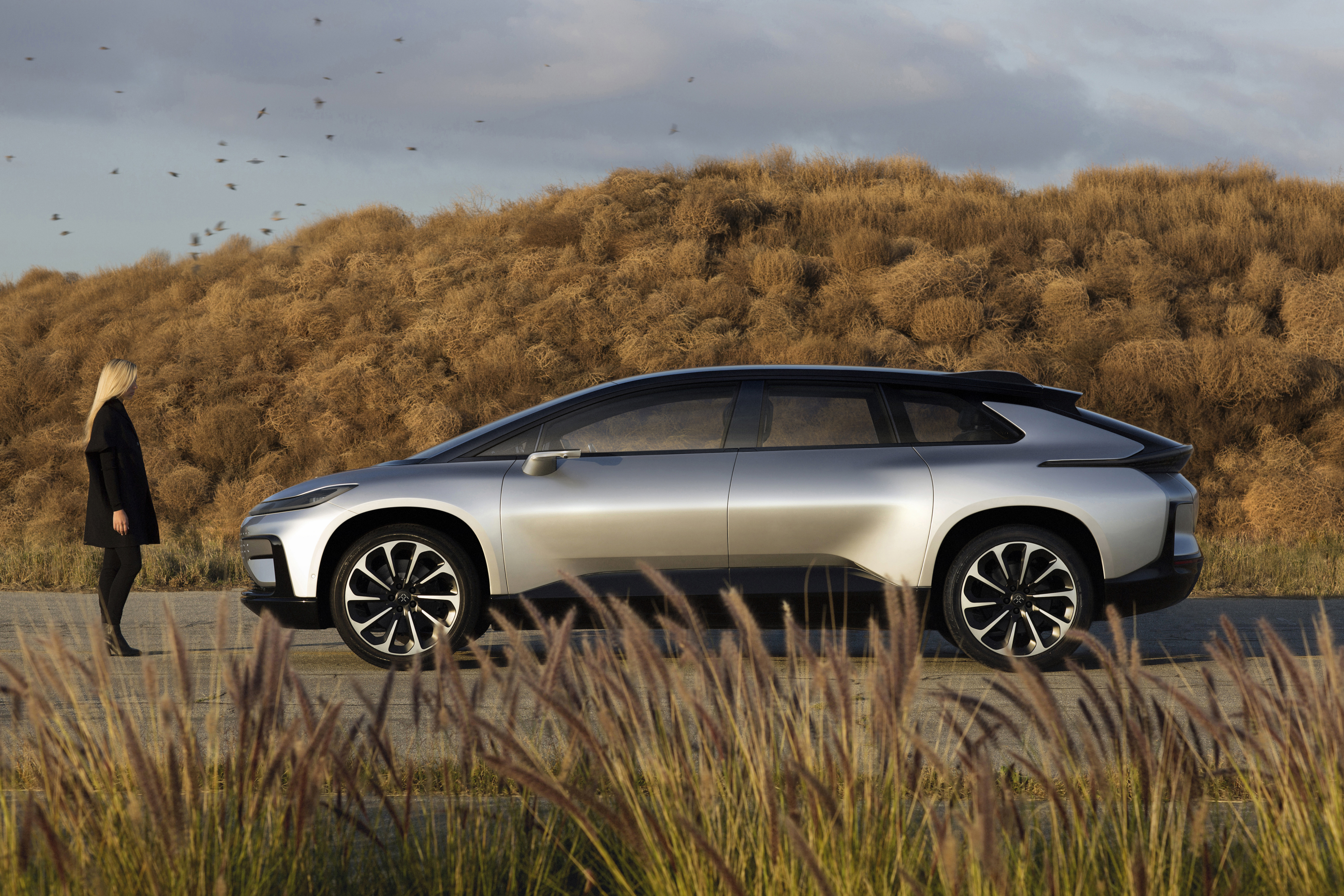
Faraday Future burst into view in 2015, announcing its FF 91 prototype not at a traditional auto show but at the massive Las Vegas Consumer Electronics Show. (Goes to show what they think about the past.) And if/when the FF 91 materializes, it will certainly raise the bar for electric cars—at least in terms of raw performance. The FF 91 will slingshot to 60mph from a standing start in a head-snapping 2.39 seconds. Peak power from three separate motors is 783 kW, equal to 1,050 horsepower with a range of 378 miles.
The FF 91 is expected to feature fully autonomous driving and advanced facial recognition technology, called Arrival Interface—a keyless entry system that recognizes faces, including passengers, along with their expressions and temperament. With that information, the FF 91 will prompt a series of actions to enhance your motoring pleasure by adjusting music, temperature, scent, and massage, among other things. That has potential to get annoying fast. Presumably, the FFCTRL app, which can also be used to instruct the vehicle to park and then summon back, will allow you to opt out of such technological overreach. Other innovative touches include a panoramic roof with smart dimming glass technology. The roof, plus rear and side windows feature Polymer Dispersed Liquid Crystal, developed by Mercedes-Benz, and activated by tapping on the glass for instant darkening.
One major caveat: Charge time leaves much to be desired, with 50 percent capacity in just under 4.5 hours at 240-volt using Faraday's proprietary home charger, included in the box. Prices for this next-generation supercar are expected be in the $180,000 range. Sales will be handled online, but no word on what that means for vehicle service calls. You can add your name to the reservation list with a fully refundable $5,000 deposit. www.ff.com. And speaking of fast cars, here are 20 Insanely Fast Cars You'll Find in A-Listers' Garages.
5
Fisker EMotion
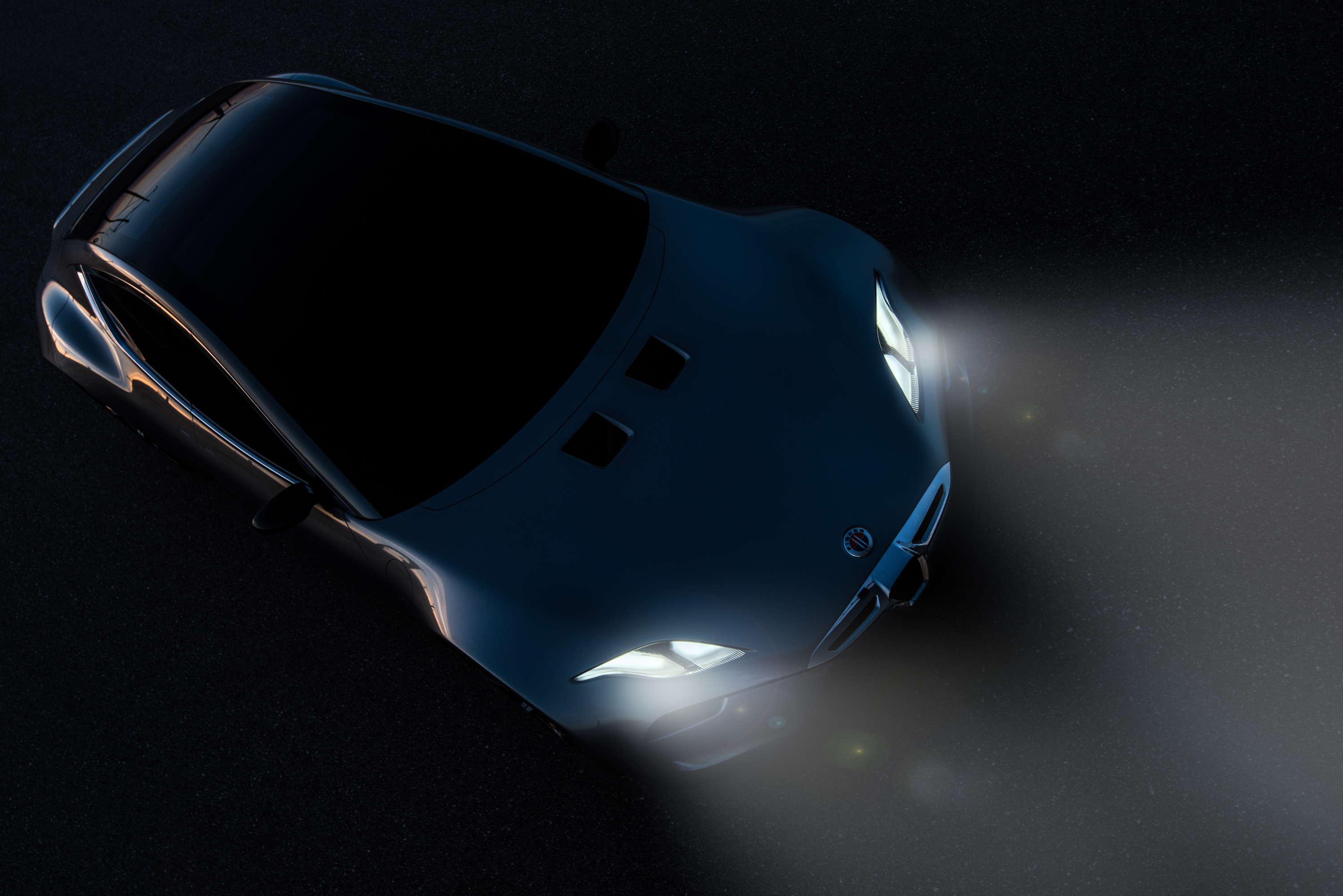
Henrik Fisker, automotive designer extraordinaire, has sculpted some significant machines including the BMW Z8, Aston Martin DB9, Aston Martin V8 Vantage, Galpin-Fisker Mustang Rocket, and VLF Force 1 V10. His new baby, the EMotion is a pure battery-electric vehicle that will come equipped with a 145 kilowatt-hour battery pack, nearly 45% larger than Tesla's, with a range of over 400 miles per charge. Paired with an 800-volt system, double that of most EVs, charge-time efficiency will be a significant improvement over competing cars, with a nine-minute charge enough for 100 miles of range using the vehicle's proprietary UltraCharger unit.
Ultra-light carbon fiber and aluminum rims help to reduce rotational mass by 40%, a major weight reduction that has improved its range. Panoramic cameras embedded in the side mirrors deliver a 360-degree view, and the company claims its patented frontal crash structure exceeds current federal safety standards. Top speed tops out at 161mph.
On track for 2019 production, prices will start at $129,900. The EMotion will be sold through Fisker online and 'experience centers' said to be in development. Addressing the question of service and maintenance, Fisker has teamed up with a new chain of service centers in North America specializing in advanced electric and hybrid vehicles, appropriately known as The Hybrid Shop. With 36 shops currently, plans call for 400 service centers worldwide by 2019. Pre-orders are under way at www.fiskerinc.com. And on the subject of electric cars, Meet the First All-Electric "Sport Utility Truck."
4
NIO EP9
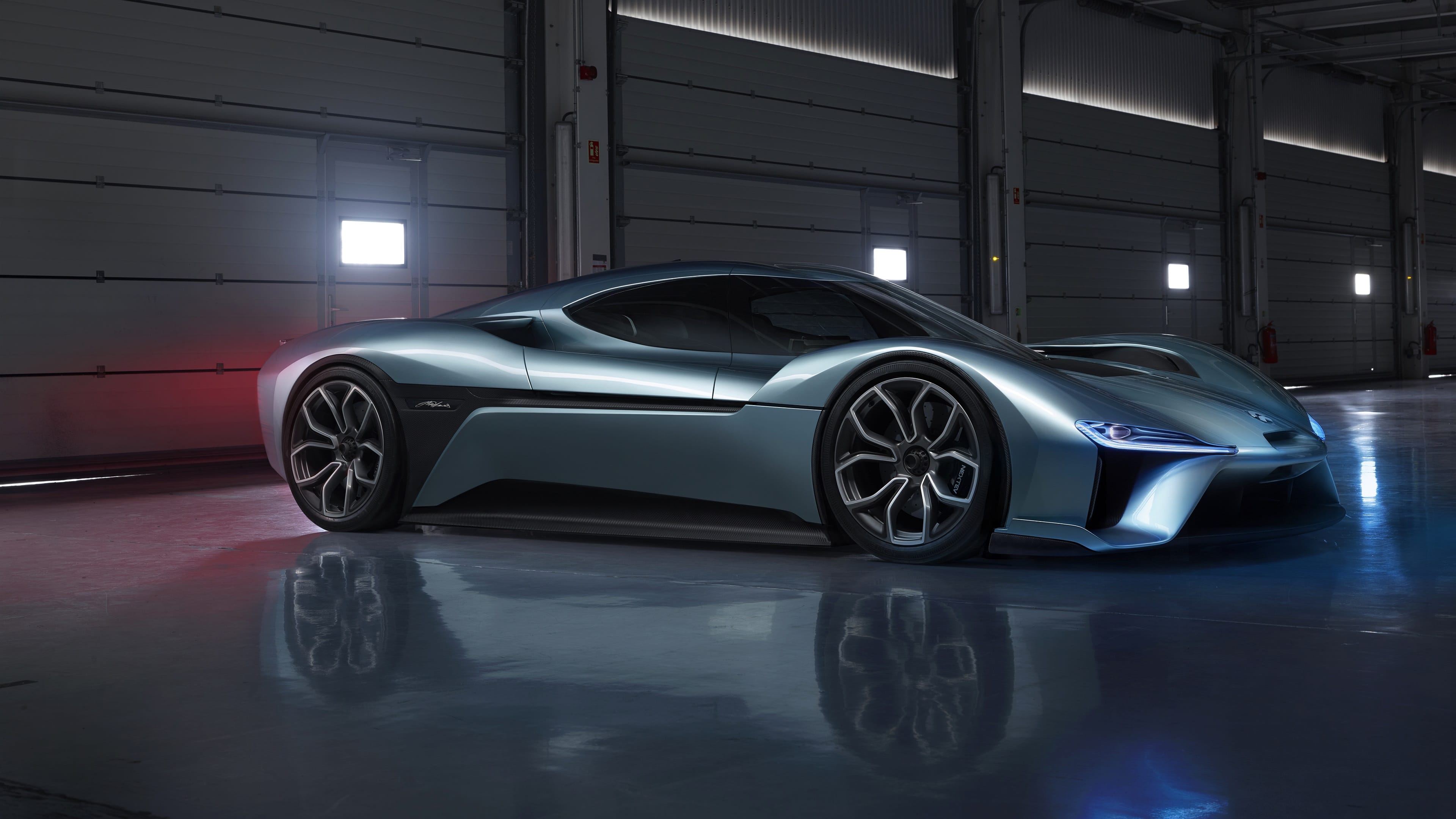
The notoriously challenging 13-mile Nordschleife circuit at the Nürburgring, home of the German Grand Prix, is where the world's carmakers strut their best stuff. The latest supercar to master the track and claim the pinnacle of performance is Chinese start-up Nio, with its electric-powered EP9. Capable of 194mph and 0 to 62 (100 kilometers) in 2.7 seconds, it currently owns the lap record of 6 minutes, 45.9 seconds, assuming the title Fastest Electric Car in the World (though not top speed). The 1,360 horsepower EP9 is street-legal, though not yet in the U.S. Seven examples have been built so far, made to order with a price tag of $1.48 million. The second run of ten EP9s is currently looking for takers.
The EP9 has four high-performance inboard motors and individual transmissions at each wheel, generating 335.25 horsepower each, for a total output of 1,341 hp (1,000 kW). It has all-wheel drive with a torque vectoring system that adjusts power to each wheel. Battery range is claimed at up to 265 miles, though it's likely not true for lead foots. Recharging takes a relatively swift 45 minutes, and the entire battery unit is replaceable in a crisp 8 minutes.
While only a select few will ever get their hands on an EP9, the lessons learned by this fine first effort will be in evidence in an autonomous mass-market EV slated for 2020, the NIO Eve. Promising a bright new future of enlightened tech, the Eve features "an artificial intelligence engine with an intuitive human interface [NOMI], providing verbal and visual connections both within the vehicle and with the outside world. Eve constantly learns about its occupants and their preferences. It is a digital companion, a robot on wheels."
This self-proclaimed "Global Start-up" with engineering and design offices in locations across the planet, is conjuring up a very different world than the one we know. NIO is poised to amaze. www.nio.io. Now while you're thinking of the cars of the future, check out The Best New Cars to Hit the Road in 2018.
3
Rimac Concept One
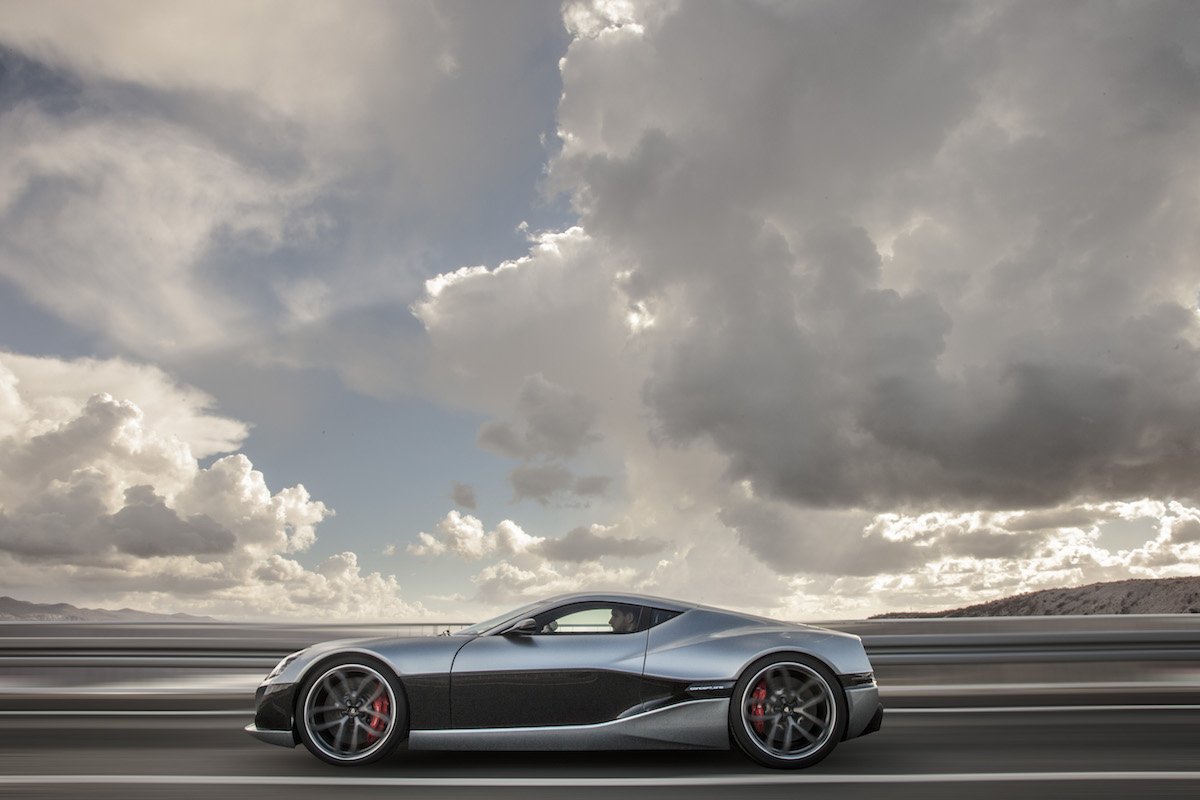
Toiling away in the fairytale land of Croatia, you'll find a brilliant little company called Rimac, named for its young, audacious founder Mate Rimac. The origins of the company begin in his garage at age 19 where Rimac began by converting his old BMW E30 to electric after he blew the engine racing. Fast forward seven years, he and his cohort have stunned the world's motoring press with their Concept One electric supercar, a 1,070 horsepower carbon-fiber monster.
The powertrain deploys four electric motors and four gearboxes mounted at the center of each axle. The front units are rated at a combined 671 horsepower, and the rear motors churn out 804 HP. It uses regenerative braking to boost up to 400 kW additional power, hurling the Concept One through space in just 6.2 seconds to reach 124mph. Top speed comes in at 221mph. The Concept S is a lighter, stronger, and more aerodynamic track-oriented update generating 1365 horsepower and 1328 lb-ft of torque.
Currently hand-built and costing over a million bucks each (like the one that Richard Hammond, host of The Grand Tour, recently destroyed in his spectacular Swiss Alps crash), production will shift to higher volumes to supply the new dealer network under way in North America, Europe, and the Middle East. www.rimac-automobili.com.
2
Porsche Mission E
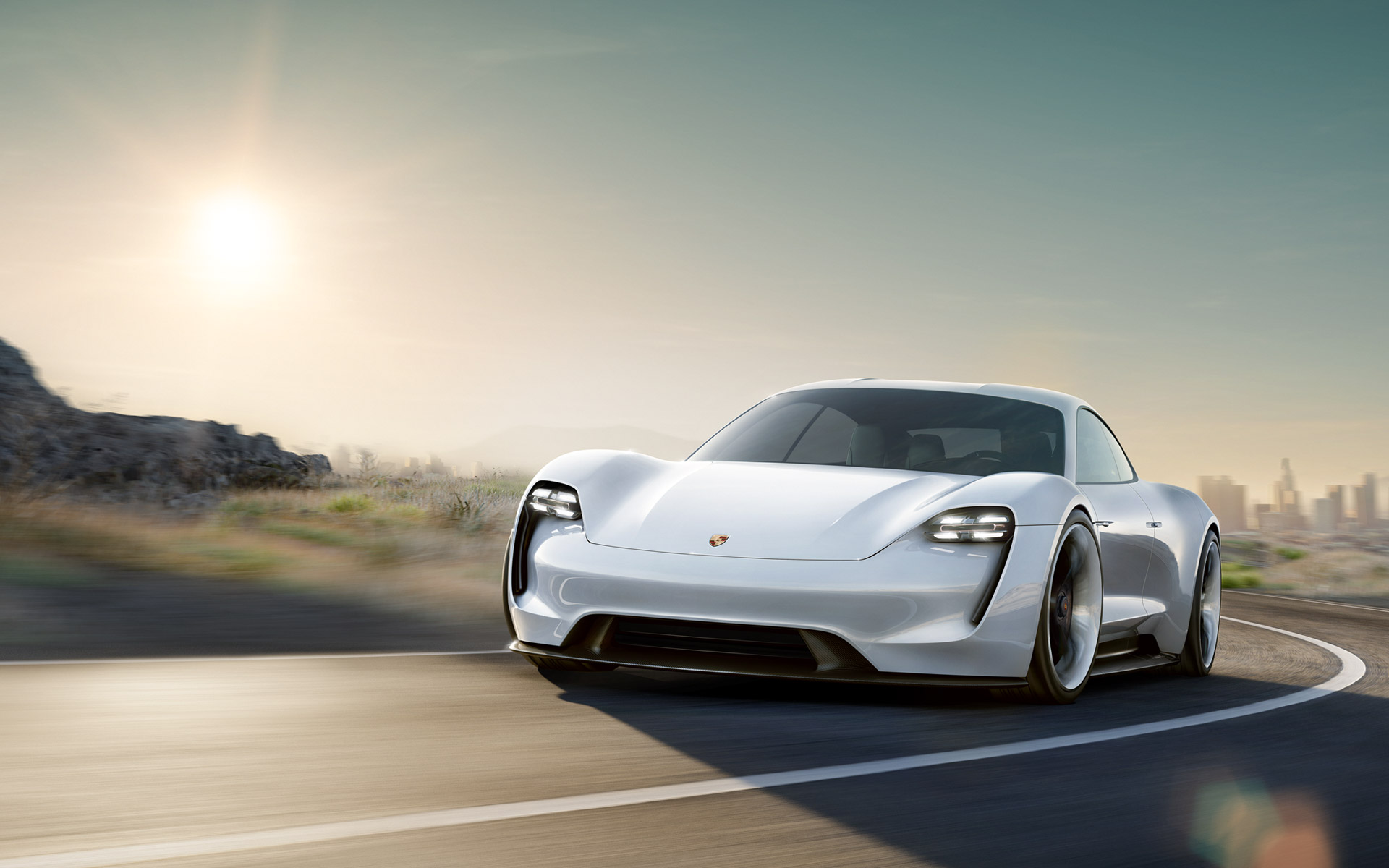
Not one to rest on its considerable laurels, Porsche intends to maintain its engineering leadership, expressed in perhaps the most beautiful EV execution to date. Surprisingly, the Mission E (expect a less clinical name by launch time) will slot into the Porsche lineup below the Panamera, at around $50,000 to $80,000, targeting the top end Tesla Model 3. Like Tesla and other EV makers, over-the-air update capability is a certainty, including upgrading horsepower remotely. What's more—and sort of crazy for, a Porsche, at first blush—will be the inclusion of Level 4 autonomous-driving technology that allows self-driving in nearly all situations. It's the best of both worlds with sports car driving dynamics when conditions permit, and autonomous capability in clogged traffic.
The fine print: 600 horsepower (440 kW) via dual electric motors with torque-vectoring driving all four wheels. Zero to 60 comes in 3.5 seconds, with a 311-mile range. Lithium-ion floor-mounted batteries are capable of 80 percent recharge in a brief 15 minutes with a specially developed 800-volt system. Porsche will also offer a wireless induction coil that integrates into a garage floor. Who knows, maybe this car will crack the list of The 10 Greatest Porsches of All Time.
Expect deliveries to start by 2019, earliest. Start queuing up now. www.porsche.com/microsite/mission-e/
1
Lucid Air
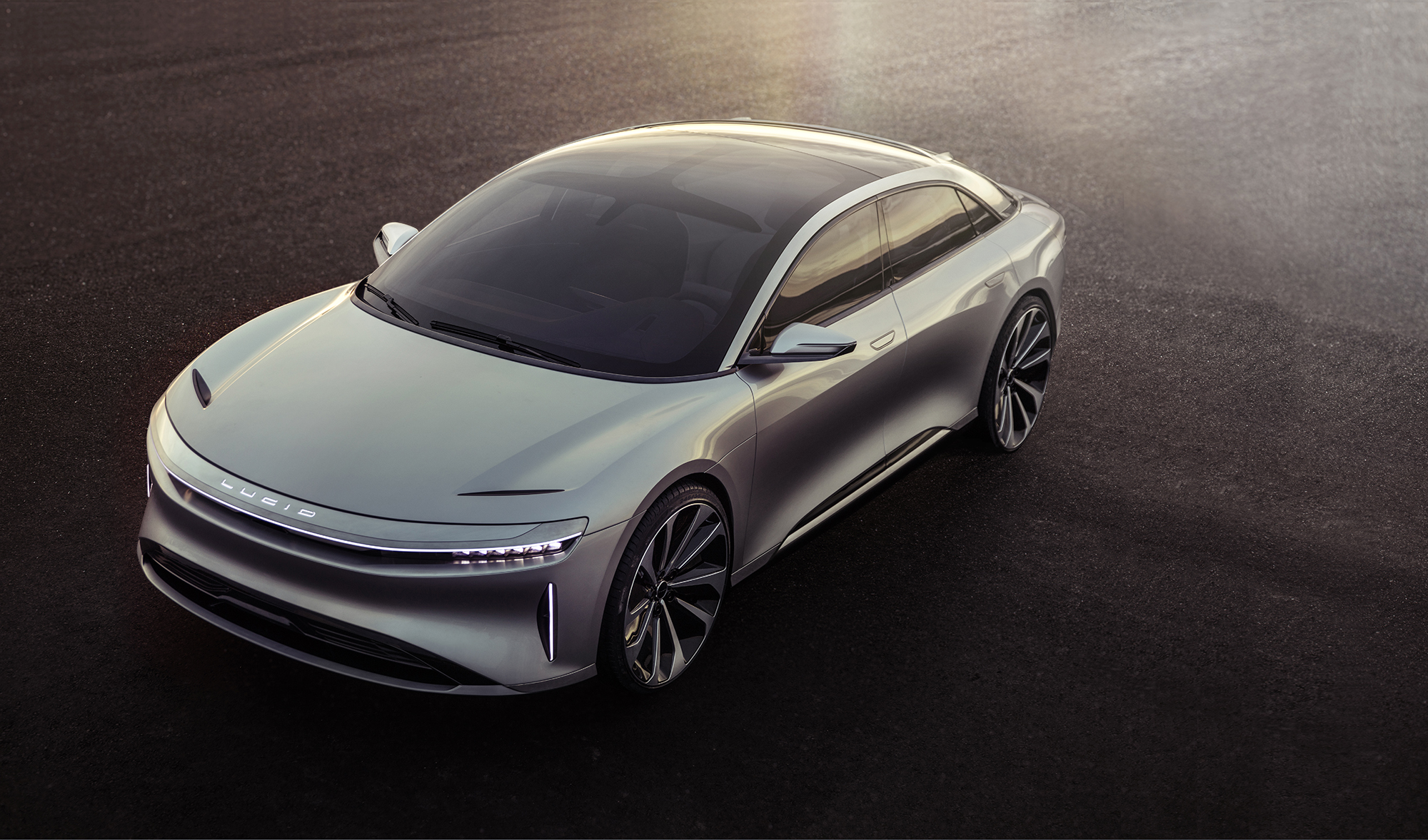
The forthcoming Lucid Air, founded by a former Tesla executive, is poised to make a splash. It's been observed in track testing at speeds up to 235mph, and it will include a semi-autonomous system from Mobileye, formerly Tesla's partner in autonomy development, now owned by Intel. It is right-sized for today's market with the exterior dimensions of a Mercedes E-Class and the interior scale of an S-Class. Regarding interior and exterior design, it's a whole other dimension. An Executive seating option includes reclining rear chairs, clearly designed with the Chinese market in mind, where back seat luxury is highly prized.
In apparent contradiction, Lucid regards sport driving as highly as autonomous driving. But it makes perfect sense. As the bright minds at Porsche have concluded with the Motion E, there is a need for both. Currently, the standard Air, priced at around $60,000 comes with a single 400 horsepower (289kW) rear motor-generator unit providing 240 miles of range. The batteries, developed in collaboration with Samsung, will sync with the company's higher-kW DC fast chargers currently in development.
Lucid will also offer the first 255 cars built as a Small-Batch Exclusivity Launch Edition, well-appointed with unique colors and badging, priced at over $100,000. Key features include a 1,000 horsepower, twin-motor unit and all-wheel drive, delivering 315 miles of range on 21-inch rims, with premium audio. With that, it's no exaggeration to say Lucid is on-track to become a new paragon of intelligent luxury.
For more amazing advice for living smarter, looking better, and feeling younger, follow us on Facebook now!





















